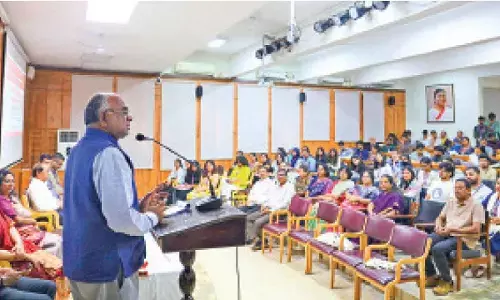The three moral codes of behaviour

The purpose of religion is to eliminate ignorance through spiritual practices until the devotee comes to gain the light of wisdom.
The purpose of religion is to eliminate ignorance through spiritual practices until the devotee comes to gain the light of wisdom.
Ignorance, manifesting as desires on the mental plane, extend themselves as actions in the world.
Therefore, spiritual masters advise that the most practical way of overcoming ignorance is through controlling our actions.
They suggest that we first purify and regulate these actions. All religions advocate qualities such as goodness, kindness, tolerance, mercy and selflessness.
They insist on moral and ethical perfection as the fundamental condition for spiritual evolution. Without these qualities we will end up far short of the goal, even after a lifetime of devotion and worship.
Let us try to understand the scope of these moral and ethical values as explained in Hinduism. When these values are practiced they enable us to master our mind, which leads to mastery over ourselves, and the world around us.
Although these principles are essentially the same in all religions, differences may appear due to the way in which they were presented to meet the needs of the people of the time.
These three moral codes of behaviour are: self-control (brahmacharya), non-injury (ahimsa), and truthfulness (satyam).
They are the source of all values, and refer to the three layers of our personality: physical, emotional and intellectual.
Self-Control
The physical body longs for contact with the world of objects in order to gain sense gratification.
The eyes wish to see beautiful forms and colours, the tongue craves good food, the nose likes to smell pleasant fragrances and so on.
But when we continue to live only for the gratification of our sensual demands, passions multiply and ultimately consume us.
To avoid such a condition, discipline (brahmacharya) at the physical level is prescribed.
The meaning of the word brahmacharya has been so badly distorted that the real value of this discipline has been lost.
Brahmacharya is an attitude of intelligent contact with the world. It does not mean a total denial of the sense enjoyments, but only insists on not overdoing anything.
Thus to read, watch television, talk, or walk too much, or to eat a morsel more than necessary would be considered as breaking the vow of brahmacharya.
Non-Injury
The second discipline, prescribed for the mental level, is non-injury (ahimsa). Ahimsa does not simply mean non-killing or non-injury at the physical level.
It is to be understood as a mental attitude regarding our relationship with others. Non-injury is the spirit that should dominate the realm of our motives.
Sometimes it is necessary that our actions be cruel although the underlying motive is totally loving and kind.
Shakespeare beautifully expressed this idea in Hamlet, "I am cruel only to be kind."
Thus, non-injury as advised by the architects of the Hindu culture is a value of life to be applied at the level of our motives.
Our motives should be blessed and pure without any cruelty or hatred. In the execution of a pure motive, we may have to weed out the thorny shrubs to make the garden beautiful again.
Truthfulness
Satyam or truthfulness is the means to govern our inner world of mind and intellect.
The outer world is a great university providing us with innumerable opportunities from which to learn.
When these experiences have been well churned in our mind and the intellect has come to a firm decision, we must have the honesty and conviction to act upon it.
When we do not make the full use of our mind and intellect, they lose their efficiency and we suffer as a result.
Religion constantly reminds us to exercise our mind and intellect through its insistence upon the principle, "Be truthful to your previously gained wisdom."
The edifice of life stands on these three great principles. By following them we can integrate our personality and gain inner health.
It is by this method alone that we can enjoy living in the world and develop the strength and courage to overcome all our problems in life.
Swami Chinmayananda










